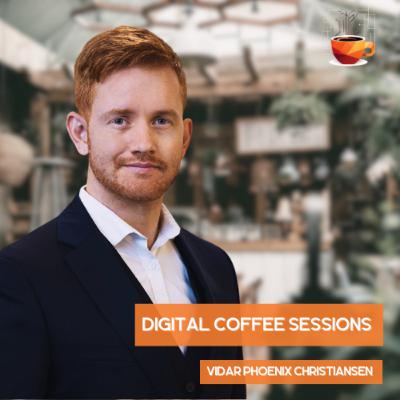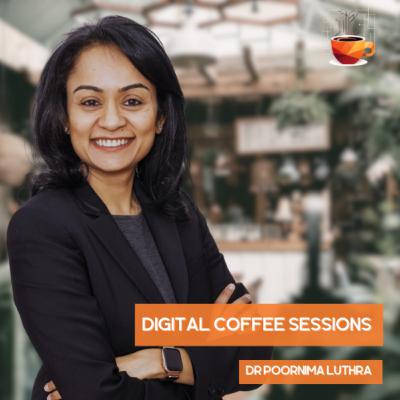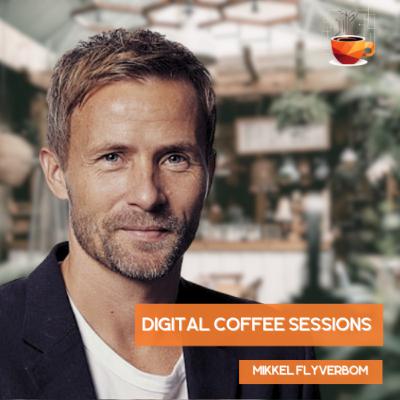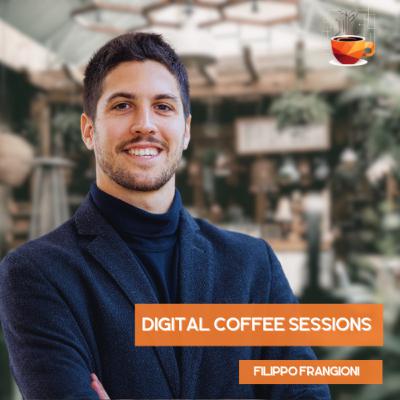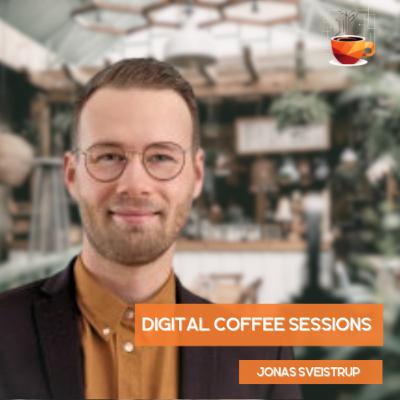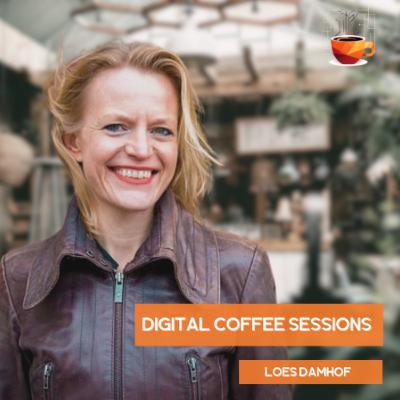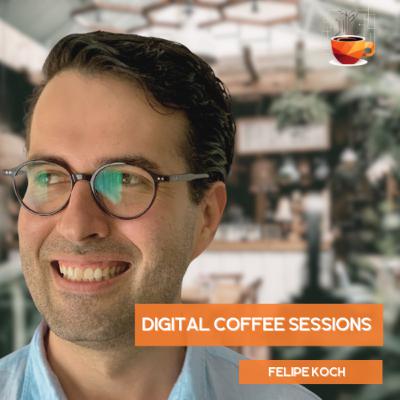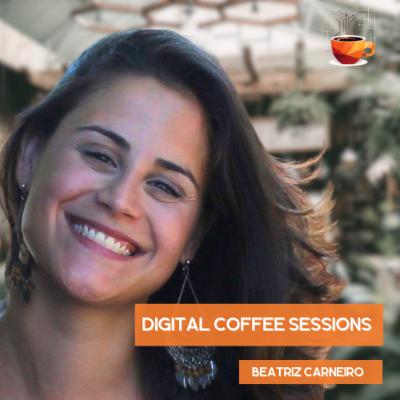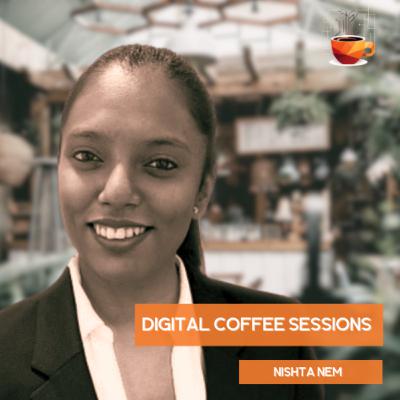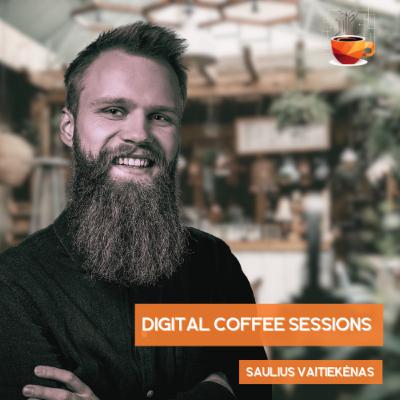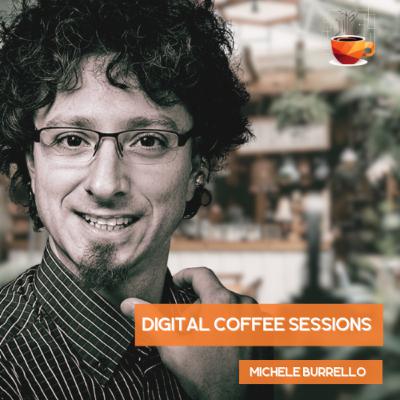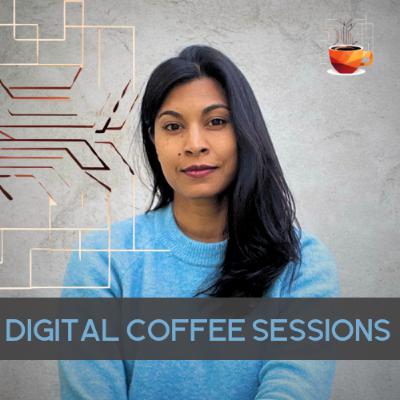Discover Digital Coffee Sessions
Digital Coffee Sessions

Digital Coffee Sessions
Author: Prichelle Rugdeo
Subscribed: 1Played: 33Subscribe
Share
© Prichelle Rugdeo
Description
Join me, Prichelle Rugdeo, as I meet with co-hosts and guests to discuss their experiences and knowledge in future technologies and emerging trends. We chat about fascinating fields of research that could shape our future.
15 Episodes
Reverse
How can we (re)connect, build meaningful relationships and create moments of joy? In this founders journey series, I sit down with Vidar Phoenix Leo Christiansen. He shares his founder's journey within Social Vibes , what he has learnt along the way and why he and the team create immersive experiences with the aim of ‘sparking connections and creating memories’.Vidar Phoenix Christiansen is a Danish entrepreneur, leader, and creative strategist dedicated to fostering human connection through technology. As the founder of Social Vibes, he aims to combat loneliness and digital isolation by helping people create meaningful social experiences. With a background in business, leadership, and psychology, he blends creativity, empathy, and strategic execution to scale innovative ventures.Raised in Denmark, Vidar’s journey, from overcoming personal hardships to traveling the world and working in sales, shaped his resilient and visionary mindset. Now based in Sweden with his Moroccan wife, he is passionate about fitness, digital art, travel, and personal growth. With Social Vibes, he envisions building a global movement that empowers people to connect deeply, embrace new experiences, and make lasting memories.Related linksVisit Social Vibes website 02:58 Meet Vidar Phoenix Christiansen05:00 Social Vibes, becoming an app08:55 Creating adventures 12:30 Developing the technology, keeping the motivation 15:46 Meeting the team, growing the team 22:40 Design choices 26:35 Founder to leader journey 39:32 Finding funding44:10 Shares some advice Continue listening…Digital ecologies with Attila MártonThis episode was: Hosted by Prichelle Rugdeo Edited by Preneil Pillay Original music by Jakob Ranum, Studio25Produced by Prichelle Rugdeo and Preneil Pillay This podcast is powered by Station and the Copenhagen School of Entrepreneurship.
What can we do?I sit down with Dr. Poornima Luthra. She shares her PracAdemic activities within academia and as a practitioner. Whether you listen to this for yourself, as a leader or for your business, she asks us to visualise our spaces and places and consider ‘What can I do?’. She does this through the core pillars within Diversity, Equity, and Inclusion.Dr. Poornima Luthra is a recognised author, keynote speaker, business consultant, and leading practitioner-academic in the field of talent management and Diversity, Equity, and Inclusion (DEI). As Associate professor at the Copenhagen Business School, she provides effective DEI thought-leadership from a global perspective, workshops, and consultancy services for organisations who are determined to nurture inclusive workplaces for their diverse talent. She has been ranked as one of the world’s 30 up-and-coming management thinkers by Thinkers50 and is a recipient of the Professional Women of Colour Denmark Impact Award and winner of the Nordic Blaze Inclusion Award. She is the author of Leading Through Bias (2023 (English)/ 2024 (Danish & Italian)), The Art of Active Allyship (2022), and Diversifying Diversity (2021) and is a contributor to Harvard Business Review on topics related to DEI.Related links or mentioned in this podcastSelected publicationsWebsite Seeking qualitative rigor in inductive research: Notes on the Gioia methodology02:30 Meet Dr. Poornima Luthra08:20 PracAdemic, activities as an academic and practitioner13:50 Understanding the core pillars of her work 20:00 Shares an exercise, asked to visualise…24:00 What can we do?31:00 An interesting research idea, would you listen to…Continue listening...Futures Literacy Lab with Beatriz CarneiroUsing the future in the present with Felipe KochBeing open to emergence with Loes DamhofThis episode was:Edited by Preneil Pillay Hosted by Prichelle Rugdeo Original music by Jakob Ranum, Studio25Produced by Prichelle Rugdeo and Preneil PillayPowered by Station and the Copenhagen School of Entrepreneurship.
How are we seen, known and governed through our visibilities?I sit down with Mikkel Flyverbom. If you are new to this podcast, we host conversations related to technology, research, innovation and the emerging future. This conversation covers all these areas and highlights important topics and emerging ideas that we may benefit from paying attention to. Mikkel Flyverbom is Professor of Communication and Digital Transformations at the Department of Management, Society and Communication, Copenhagen Business School (CBS), Denmark. Also, he is founding academic director of the BSc in Business Administration and Digital Management program at CBS.His research on digital transformations, data, internet governance, and tech companies has been published in leading international journals, such as Business & Society, The Information Society, Telecommunications Policy, Organization Studies, Management Communication Quarterly, Organization, as well as a number of books. His most recent book, The Digital Prism: Transparency and Managed Visibilities in a Datafied World has been published by Cambridge University Press.He has been a visiting professor at Stanford University, University of California, Santa Barbara, Rutgers University, Bamberg University and Luiss University.He is a member of the Danish government’s Data Ethics Council, a member of the Expert Group for the AI Task Force and former chairman of the Expert Group on Tech Giants. He also writes a regular tech column for the Danish newspaper Politiken, and is a widely used media expert on digital transformations and the tech industry.Related links or mentioned in this podcastSelected publications from Mikkel FlyverbomThe Digital Prism: Transparency and Managed Visibilities in a Datafied WorldTech giants' role as digital infrastructure - Report 3 from the government's expert group on tech giantsShoshana Zuboff’s website and publications 02:00 Meet Mikkel Flyverbom08:10 As a member of the Data Ethics Council13:00 Discussing the Expert Group on Tech Giants18:00 Digital Prism22:22 Leadership considerations 24:00 Shares his upcoming research interests29:00 Vinyl Continue listening...Using the future in the present with Felipe KochBeing open to emergence with Loes DamhofDigital ecologies with Attila MártonBlockchain use cases with Jonas Sveistrup SøgaardThis episode was:Edited by Preneil PillayHosted by Prichelle Rugdeo Original music by Jakob Ranum, Studio25Produced by Prichelle Rugdeo and Preneil PillayPowered by Station and the Copenhagen School of Entrepreneurship.
Discovering use cases for Blockchain within HealthcareI sit down with Filippo Frangioni. He shares his journey into Blockchain, 3 Blockchain use cases within healthcare and adoption challenges within the industry. We also get to talk about ‘Community of practice’ and the Blockchain Communities of Practice he has started. Filippo Frangioni is a Product Manager at Novo Nordisk, where he has spearheaded innovation in AI and blockchain, driving the development of digital products within the pharmaceuticals sectors. With a blend of technical expertise and commercial insight, he has been instrumental in advancing digital transformation projects within healthcare. Filippo also serves as Head of Partnerships at the Nordic Blockchain Association, fostering connections within the Web3 community through memberships, regulatory initiatives, and events like the Nordic Blockchain Conference.Related links or mentioned in this podcastCommunities of practice: A brief introduction (Journal) Blockchain in clinical trials (ScienceDirect Journal)Decentralized science (DeSci) (Website)The Emergence of Biotech DAOs (Blog) Decentralized Science: The Future of Scientific Exploration Inspired by Meta- and Open-Science Principles (Blog)Leading on post-quantum technology(Website)02:00 Meet Filippo Frangioni04:25 What is a public and a private Blockchain 05:40 What is a Blockchain distributed ledger07:16 Background into healthcare and pharmaceutical industry07:40 Use Case: Product traceability 08:44 Use Case: Clinical trials11:40 Use Case: Decentralised science (DeSci)14:30 Encryption15:40 Adoption challenges18:30 Blockchain Communities of Practice28:42 A parting thought and a quoteContinue listening, up nextDigital ecologies with Attila MártonBlockchain use cases with Jonas Sveistrup SøgaardThis episode was:Edited by Preneil Pillay Hosted by Prichelle Rugdeo Original music by Jakob Ranum, Studio25Produced by Prichelle Rugdeo and Preneil PillayPowered by Station and the Copenhagen School of Entrepreneurship.
Considering shifts in business models and collaborative advantagesToday I sit down with Jonas Sveistrup Søgaard. We talk about a business transaction; as it is today, as it is on Blockchain and why we may start to see more Blockchain use cases emerge. He also shares concepts and reasons related to shifts in business models and explains differences between AI and blockchain adoption cycles. Jonas Sveistrup Søgaard is an expert in blockchain technology and innovation and works as Technology Director at Devoteam. His focus spans a range of technologies, including blockchain, IoT, and GenAI, with a specific emphasis on applications in the public sector, industrial processing, and banking compliance.As part of an industrial PhD program, Jonas collaborated with organizations like Erhvervsstyrelsen, CBS, and Deloitte to research the impact of blockchain technology on market practices, particularly in the areas of domestic and cross-border transactions. This work involved benchmarking and simulating trade finance applications across multiple blockchain platforms. With his extensive background spanning technology, policy, and real-world implementations, Jonas offers a unique perspective on the evolving landscape of blockchain and related innovations.Related links or mentioned in this podcastCost of Trust (RMIT, Paper) Unlocking Privacy on Ethereum with Paul Brody(podcast)Evaluating trust infrastructure of emergent technologies (LinkedIn post)AI’s impact of Business Models: A New Paradigm for Organizations (LinkedIn post)00:60 How I met Jonas Sveistrup Søgaar 03:40 Jonas shares his study and career journey 08:00 Blockchain, a coordination mechanism 13:00 Green Act of Europe and the Digital product passport 16:15 Shift in business models, Scope 1, 2, 319:00 Collaborative advantage, co-innovation risk and adoption chain risk24:33 Trust, transparency and traceability28:56 Skills, the job market and adoption cycles 33:55 Ecosystems thinking, shares an example36:00 Discussing de-dollarisationContinue listening, up nextDigital ecologies with Attila MártonBlockchain Healthcare use cases with Filippo FrangioniThis episode was,Edited by Preneil Pillay Hosted by Prichelle Rugdeo Original music and sound mastering by Jakob Ranum, Studio25Produced by Prichelle Rugdeo and Preneil Pillay
What society needs to be in place in order for what we observe to be not only acceptable but also desirable?I sit down with Attila Márton. We talk about what captures his attention when he is not teaching at the Copenhagen Business School or researching digitalization of core social phenomena. He shares what we can learn from ecological thinking, shares some ecological perspectives, discusses platforms as an organisational form and highlights some guiding principles a business, start up or individual could follow or be aware of in terms of digitalization.Attila Márton is a Digital Ecologist. His research focuses on propelling ecosystemic thinking to make digitalization serve humanity. To this effect, he is currently exploring the co-evolutionary dynamics between platforms and their respective ecosystems, the political ecology of digital labour and AI, the sociology of digital knowledge and forgetting, and the re-decentralization of the Internet.Related Links or mentioned in this podcastA digital future of resilience: What can we learn from ecological thinking?Selected publicationsVoyant tools00:47 Meet Attila Marton08:07 Shares insights into his writing process 12:05 Attila’s selected publications: Digital, Information, Platforms and New 13:22 Discussing Platforms and Sharing Platforms16:19 Platforms as an organisational form: changing how we are used to organising18:10 Social media and labour platforms20:00 Ecologies, a mind set 27:15 How do ‘ecological systems’ self regulate and what can we learn 28:48 First principles thinking29:00 Shares an example, it was not the one I was thinking of31:04 Discussing resilient and robust, within the system itself 33:20 Variety and redundancy 38:25 From an ecological perspective: AI 45:31 Asked to share one thing he would like us to knowContinue listening, up nextBlockchain use cases with Jonas Sveistrup SøgaardBlockchain Healthcare use cases with Filippo FrangioniThis episode was,Edited by Preneil Pillay Hosted by Prichelle Rugdeo Original music and sound mastering by Jakob Ranum,. Studio25Produced by Prichelle Rugdeo and Preneil PillayPowered by Station and the Copenhagen School of Entrepreneurship.
How can we be open to emergence and embrace uncertainty?I sit down with Loes Damhof. She joins me to discuss her work; within Higher Education and the Emergence Academy, and how futures literacy could be used within a business context. Loes Damhof was elected as Lecturer of the Year of all higher education in The Netherlands in 2016, and decided to spend the attached prestigious Comenis Award on developing Futures Literacy pilots. As a UNESCO Chair on Futures Literacy in Higher Education, she consults and trains staff of global organizations such as FutureWomenX, UNESCO, UNFCCC, ClimateKIC, FORMS, UN, Copenhagen Institute for Futures Studies and Oxfam in multidisciplinary projects. As a Futures Literacy Expert, she designs, develops and facilitates so-called Futures Literacy Labs: collective intelligence knowledge creation processes across the globe that challenge and raise fundamental questions on leadership, migration, climate change and technology. She is a Future Fellow at Hawkwood College, a steering committee member of the Futures Oriented Museum Synergies and an editor for the Journal of Futures Studies. 1:50 Meet Loes Damhof3:20 Shares her work as a UNESCO Chair on Futures Literacy in Higher Education7:16 How is futures literacy used within a business context13:00 Shares her work within the Emergence Academy19:39 Sensing and sense making 25:36 Could we slow down?33:15 Shares what she is presently up toContinue listening, up nextFutures Literacy Lab with Beatriz CarneiroUsing the future in the present with Felipe KochThis episode was,Edited by Preneil Pillay Hosted by Prichelle Rugdeo Original music and sound mastering by Jakob Ranum, Studio25Produced by Prichelle Rugdeo and Preneil Pillay
How can we develop the capability of using the future in the present?I sit down with Felipe Koch. He joins me to discuss images of the future, anticipation, UNESCO’s Futures Literacy and how people experience time. Felipe Koch is an assistant professor of Brazilian Studies and Societal Innovation at the University of Paris-Est Créteil. He has a PhD in Sociology of the Imaginary and has recently been elected as Vice-Dean of the AEI International School, also holding the position of Head of Graduate Studies. He leads undergraduate and postgraduate minors within Management and International Trade at AEI. An expert in; exploring societal impacts of imaginaries, social innovation, and future studies, he is also a senior trainer in Futures Literacy and a keynote speaker.Related links or mentioned in this podcastNarrative and the Imaginary: A Review of Gilbert Durand's "The Anthropological Structures of the Imaginary"Yuval Noah Harari (Website) Yongey Mingyur Rinpoche (Book) Sam Harris (Website) 1:25 Meet Felipe Koch 4:20 What is Futures Literacy and Futures Literacy Labs 7:30 What is ‘anticipation’ and how do we use it 9:00 Felipe's work in Collective anticipation 15:25 The compass game and agency 19:22 Discussing how people experience time 24:56 Felipe's s advice on building Futures Literacy capabilities 28:15 AI and imaginationContinue listening, up nextFutures Literacy Lab with Beatriz CarneiroBeing open to emergence with Loes DamhofThis episode was,Edited by Preneil Pillay Hosted by Prichelle Rugdeo Original music and sound mastering by Jakob Ranum, Studio25Produced by Prichelle Rugdeo and Preneil Pillay
Step into a Futures Literacy Lab; Future of… Enterprise 2074.Today I sit down withBeatriz Carneiro. She joins me to share her journey into Futures Literacy and her academic journey. We get to step into a ‘Time machine’ to consider the Future of … in this case… Enterprise in 2074.Beatriz Carneiro has a degree in Genetics and a MSc in Ecology from the Federal University of Rio de Janeiro (UFRJ). She has experience in the intersection between management, biodiversity and climate change. Currently, she is a PhD candidate in Environmental Sciences and Conservation at UFRJ, researching synergies within post-development philosophies and anticipation for future. She participates in the UNESCO Chair on Futures Literacy, a partnership betweenMuseu do Amanhã (Museum of Tomorrow - Instituto de Desenvolvimento e Gestão) and UFRJ.3:10 Meet Beatriz Carneiro10:25 Understanding Futures Literacy Labs 15:40 Step into a Time machine: Explore Enterprise in 207422:20 Discussing a Reframe scenario 30:38 How do humans process the idea of the future45:00 Museu do Amanhã 55:00 Discussing Earth Overshoot DayWe note small audio drops between timestamps 3:10 and 10:25 and have opted to retain the audio. We hope you will still enjoy this conversation.Continue listening, up nextUsing the future in the present with Felipe KochBeing open to emergence with Loes DamhofThis episode was,Edited byPreneil Pillay Hosted byPrichelle Rugdeo Original music and sound mastering by Jakob Ranum, Studio25Produced by Prichelle Rugdeo and Preneil Pillay
How could Quantum startups begin their business development journey?In this session, I sit down Nishta R. Nem. Since visiting the Center for Quantum Devices at the Niels Institute in Copenhagen, I was interested in understanding the start-up ecosystem for Quantum. I reached out to Nistha, who was available to speak to us and share her experiences in business development for this developing industry.Nishta R. Nem is an experimental physicist with a PhD in fusion energy and a secondary specialisation in quantum physics. During her career, she has designed and built many different diagnostics and hardware. After gaining the necessary technical and scientific understanding of deep tech, she now helps early-stage quantum startups as a business developer. She assists first-time founders with the development of their business plans and fundraising and also leads the Venture Lab, Quantum program at Deep Tech Lab. It is an accelerator program for early-stage companies.Continue listening, up nextQuantum Computing with Michele BurrelloQuantum Devices with Saulius Vaitiekenas2:28 Meet Nishta Nem 6:26 Business development journey 10:00 Diana program 11:00 Venture lab Quantum program 13:30 Is a working prototype needed to support the application? 16:05 'Founder friendly' and investment cycles 20:47 The funding landscape: Denmark, EU and US 24:52 Understanding founder profiles 28:00 Understanding a ‘call’ for applications 30:30 Connecting to talent 33:03 Advice to foundersThis episode was,Edited byPreneil Pillay Hosted by Prichelle Rugdeo Original music and sound mastering by Jakob Ranum,Studio25Produced by Prichelle Rugdeo and Preneil Pillay
What happens at one of the coldest places in the universe?For this session, I visited the Centre for Quantum Devices at the Niels Bohr Institute (NBI).I visited my last guest,Michele Burrello, and today’s guest,Saulius Vaitiekenas at their lab. We took a tour of the lab and of the different quantum devices they develop and test. In this episode, I discuss with Saulius the tangible ways in which quantum devices are created, particularly the technology and processes used to develop these platforms and we unpack some of the concepts we previously discussed with Michele.Saulius Vaitiekenas' research combines different materials, such as semiconductors and superconductors, and constructing devices to create rare or non-natural physical settings. He is an experimental condensed matter physicist and studies emergent quantum phases in hybrid material platforms. A Lithuanian physicist, Saulius studied at the Free University of Berlin and got his PhD in Physics from the University of Copenhagen in 2020.3:38 Meet Saulius Vaitiekenas5:43 A day in the lab at the Centre for quantum devices 7:30 Working in the clean room 8:30 Using lithography techniques 10:16 Touring the lab14:40 Energy scales and observing materials 17:15 Dilution refrigerators, a technological marvel20:10 Semiconductors and superconductors materials24:20 Saulius's collaborations 24:56 Saulius shares views on how the field could progress: fundamental research, applications Continue listening, up nextQuantum Computing with Michele BurrelloQuantum startups with Nishta R. NemThis episode was,Edited by Preneil Pillay Hosted by Prichelle Rugdeo Original music and sound mastering by Jakob Ranum, Studio25Produced by Prichelle Rugdeo and Preneil Pillay
How does a theoretical physicist design beautiful quantum systems?In this episode I learn how a theoretical physicist designs quantum devices and explores their physical characteristics. These quantum devices can be used as building blocks for quantum computers to solve some class of problems, like cryptography and logistics. While I was on the search for practical applications, I learn that the motivation for pure research often lies in the beauty of the system that is studied and exploring the border between "what is known and what is unknown". Michele Burrello is currently an Associate professor at the Niels Bohr Institute of Copenhagen, Denmark. He works on condensed matter theory and applications of quantum systems. He is an Italian physicist and studied at the Scuola Normale of Pisa (Italy) and got his PhD in statistical physics at SISSA (Trieste, Italy) in 2011. He previously worked at the University of Leiden (The Netherlands), the Max Planck Institute for Quantum Optics (Garching, Germany). Mentioned or related to the episode:Unbreakable fibre network connection established between DTU and Niels Bohr InstituteQuantum key distribution using deterministic single-photon sources over a field-installed fibre link 2:15 Meet Michele Burrello 5:20 Interesting work as a theoretical physicist 8:39 Basic research and theoretical aspects 9:00 How basic research could support commercial progress 10:24 How ideas could transfer to application 14:19 ones and zeros… how does information processing change 16:00 What is a ‘platform’ at the level of nano electronics 22:60 Discussing problems quantum computers could solve 28:31 Error correction 32:00 Michele’s interests in studying hybrid systems 33:10 Other branches of quantum technologies 35:20 A feeling of magicContinue listening, up nextQuantum Devices with Saulius VaitiekenasQuantum startups with Nishta R. NemThis episode was,Edited byPreneil Pillay Hosted byPrichelle Rugdeo Original music and sound mastering by Jakob Ranum, Studio25Produced by Prichelle Rugdeo and Preneil Pillay
ITER, fusion energy supply chains and a case for fusionSøren Bang Korsholm and I sit down to talk about the ITER project, fusion energy supply chains and a case for Fusion.He is a senior scientist at DTUs Department of Physics, Project manager for the development of the Collective Thomson Scattering (CTS) diagnostic system for ITER under contract with Fusion for Energy. He is also the co-founder and partner in the BigScience.dk initiative. 3:20 Meet Søren Bang Korsholm 4:15 Søren’s research within Plasma diagnostics 9:00 What is the ITER project 15:10 Søren’s role within the ITER project 17:35 A case for Fusion 22:33 Fusion energy supply chains 23:34 Søren’s role within BigScience.dk and DANFusion 25:43 Outlook for the future with respect to Fusion energyContinue listening, up nextFusion Energy with Matthias WiesenbergerThis episode was,Edited by Preneil Pillay Hosted by Prichelle Rugdeo Original music and sound mastering by Jakob Ranum, Studio25Produced by Prichelle Rugdeo and Preneil Pillay
How can we copy the Sun as an energy source here on Earth?In this episode, we get to hear how Fusion is the energy of the Sun and stars and holds the potential for abundant, clean energy for humanity. However, there are challenges that emerge when trying to reproduce conditions similar to the core of a star here on Earth. Matthias Wiesenberger holds a PhD in physics from the University of Innsbruck, Austria and currently works as a researcher at the Danish Technical University in Copenhagen, Denmark. He is the author of several publications in theoretical Fusion physics, numerical analysis and high-performance computing.2:00 Meet Matthias Wiesenberger4:35 What is Fusion Energy 9:58 How can we model the Sun here on Earth 17:00 Design approaches, Inertial and Magnetic 26:15 Research within theoretical modelling 32:20 Leveraging high performance computing 34:00 Feltor, a software to study fluid dynamics (specifically plasma) and turbulence36:00 Discussing commercial viability39:00 Start-ups in Fusion Energy Continue listening, up nextThe Fusion Age with Søren Bang KorsholmThis episode was,Edited by Preneil Pillay Hosted by Prichelle RugdeoOriginal music and sound mastering by Jakob Ranum, Studio25Produced by Prichelle Rugdeo and Preneil Pillay
Welcome to the Digital coffee sessions.
I'm your host, Prichelle. Every month I will delve into topics related to technology and the emerging future. In each episode, I sit down with researchers, entrepreneurs or enthusiasts, from various fields, who share their insights and experiences over a warm beverage in our virtual studio.
So, grab your favourite drink and get ready to embark on an audio journey.
Let's explore together!


